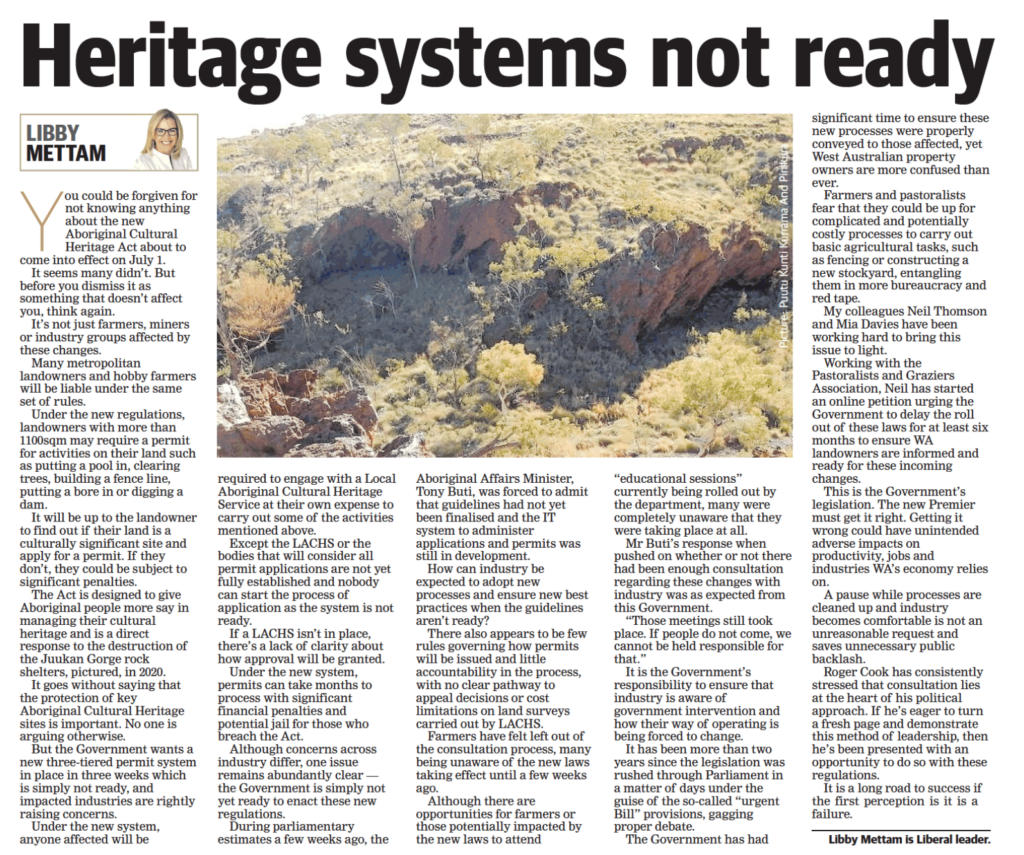
Article by Libby Mettam courtesy of the West Australian.

You could be forgiven for not knowing anything about the new Aboriginal Cultural Heritage Act about to come into effect on July 1.
It seems many didn’t. But before you dismiss it as something that doesn’t affect you, think again.
It’s not just farmers, miners or industry groups affected by these changes.
Many metropolitan landowners and hobby farmers will be liable under the same set of rules.
Under the new regulations, landowners with more than 1100sqm may require a permit for activities on their land such as putting a pool in, clearing trees, building a fence line, putting a bore in or digging a dam.
It will be up to the landowner to find out if their land is a culturally significant site and apply for a permit. If they don’t, they could be subject to significant penalties.
The Act is designed to give Aboriginal people more say in managing their cultural heritage and is a direct response to the destruction of the Juukan Gorge rock shelters, pictured, in 2020.
It goes without saying that the protection of key Aboriginal Cultural Heritage sites is important. No one is arguing otherwise.
But the Government wants a new three-tiered permit system in place in three weeks which is simply not ready, and impacted industries are rightly raising concerns.
Under the new system, anyone affected will be required to engage with a Local Aboriginal Cultural Heritage Service at their own expense to carry out some of the activities mentioned above.
Except the LACHS or the bodies that will consider all permit applications are not yet fully established and nobody can start the process of application as the system is not ready.
If a LACHS isn’t in place, there’s a lack of clarity about how approval will be granted.
Under the new system, permits can take months to process with significant financial penalties and potential jail for those who breach the Act.
Although concerns across industry differ, one issue remains abundantly clear — the Government is simply not yet ready to enact these new regulations.
During parliamentary estimates a few weeks ago, the Aboriginal Affairs Minister, Tony Buti, was forced to admit that guidelines had not yet been finalised and the IT system to administer applications and permits was still in development.
How can industry be expected to adopt new processes and ensure new best practices when the guidelines aren’t ready?
There also appears to be few rules governing how permits will be issued and little accountability in the process, with no clear pathway to appeal decisions or cost limitations on land surveys carried out by LACHS.
Farmers have felt left out of the consultation process, many being unaware of the new laws taking effect until a few weeks ago.
Although there are opportunities for farmers or those potentially impacted by the new laws to attend “educational sessions” currently being rolled out by the department, many were completely unaware that they were taking place at all.
Mr Buti’s response when pushed on whether or not there had been enough consultation regarding these changes with industry was as expected from this Government.
“Those meetings still took place. If people do not come, we cannot be held responsible for that.”
It is the Government’s responsibility to ensure that industry is aware of government intervention and how their way of operating is being forced to change.
It has been more than two years since the legislation was rushed through Parliament in a matter of days under the guise of the so-called “urgent Bill” provisions, gagging proper debate.
The Government has had significant time to ensure these new processes were properly conveyed to those affected, yet West Australian property owners are more confused than ever.
Farmers and pastoralists fear that they could be up for complicated and potentially costly processes to carry out basic agricultural tasks, such as fencing or constructing a new stockyard, entangling them in more bureaucracy and red tape.
My colleagues Neil Thomson and Mia Davies have been working hard to bring this issue to light.
Working with the Pastoralists and Graziers Association, Neil has started an online petition urging the Government to delay the roll out of these laws for at least six months to ensure WA landowners are informed and ready for these incoming changes.
This is the Government’s legislation. The new Premier must get it right. Getting it wrong could have unintended adverse impacts on productivity, jobs and industries WA’s economy relies on.
A pause while processes are cleaned up and industry becomes comfortable is not an unreasonable request and saves unnecessary public backlash.
Roger Cook has consistently stressed that consultation lies at the heart of his political approach. If he’s eager to turn a fresh page and demonstrate this method of leadership, then he’s been presented with an opportunity to do so with these regulations.
It is a long road to success if the first perception is it is a failure.
Libby Mettam is Liberal leader.